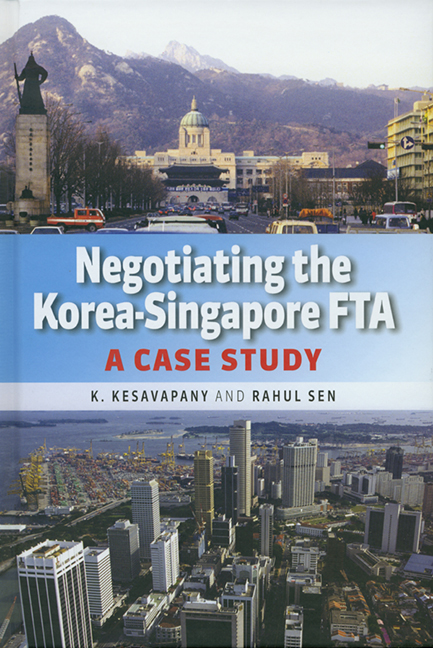Book contents
- Frontmatter
- Contents
- Foreword
- Preface
- 1 Background to the Korea-Singapore FTA
- 2 Singapore and Korea: Expanding Economic Linkages
- 3 Korea-Singapore Economic Relations After FTA: Towards a Mature Partnership
- 4 Salient Features of the KSFTA and Expected Benefits for Singapore
- 5 Singapore-Korea Business Linkages Post-KSFTA and Implementation
- 6 Concluding Remarks
- Notes
- References
- Appendix The Free Trade Agreement Between Korea and Singapore
6 - Concluding Remarks
Published online by Cambridge University Press: 21 October 2015
- Frontmatter
- Contents
- Foreword
- Preface
- 1 Background to the Korea-Singapore FTA
- 2 Singapore and Korea: Expanding Economic Linkages
- 3 Korea-Singapore Economic Relations After FTA: Towards a Mature Partnership
- 4 Salient Features of the KSFTA and Expected Benefits for Singapore
- 5 Singapore-Korea Business Linkages Post-KSFTA and Implementation
- 6 Concluding Remarks
- Notes
- References
- Appendix The Free Trade Agreement Between Korea and Singapore
Summary
The KSFTA, Korea's first comprehensive bilateral FTA, will not only provide significant economic benefits for Singapore, but also provide a framework for building a strong strategic and economic partnership between Korea and ASEAN countries. It is therefore designed to be a building block in the process of community-building efforts towards an East Asian Community in the long run. The efforts by IE Singapore to expand business linkages after the enforcement of the KSFTA offer valuable lessons in the implementation of FTAs.
However, it is important to note that the KSFTA, while being an important constituent of this process, will need to be supported by similar ongoing efforts by Korea and other ASEAN members. These countries would therefore need to strive towards negotiating comprehensive bilateral FTAs that generate substantial and concrete economic benefits in not just commodity trade and service transactions, but in reducing transaction costs and in bringing about greater transparency and private-sector participation in the business environment in Asia. Towards this end, FTAs do serve as an important regional community-building tool towards adjusting to the forces of globalization. However, while negotiating such agreements, important domestic reforms to boost competitiveness would need to be addressed simultaneously to generate a win-win situation for all parties involved in such negotiations. This would be particularly crucial for middle- and lower-income developing countries in Asia that do not possess enough bargaining power during negotiations to generate substantial economic benefits through an FTA.
- Type
- Chapter
- Information
- Negotiating the Korea-Singapore FTAA Case Study, pp. 36Publisher: ISEAS–Yusof Ishak InstitutePrint publication year: 2007



